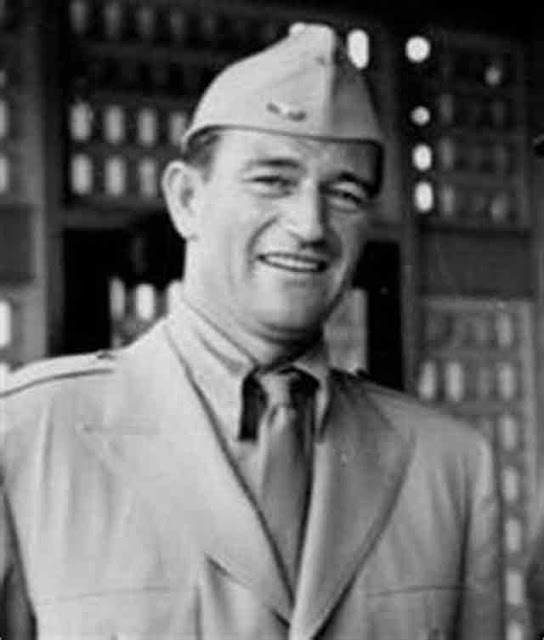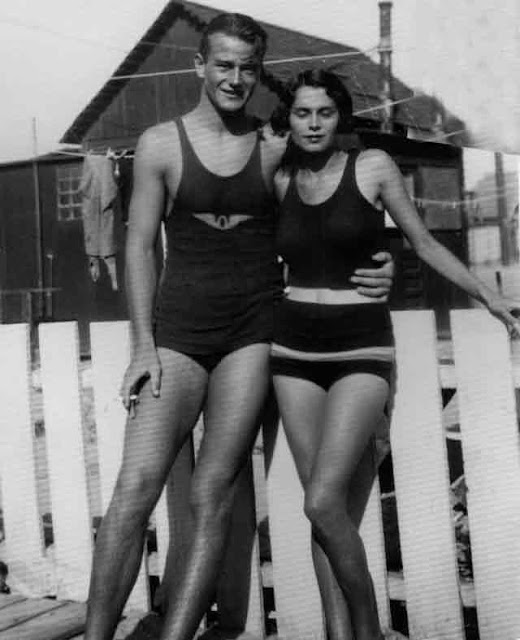Hero or Draft Dodger? The John Wayne Question
 |
| The photograph above was taken at the Albion Park Raceway, Breakfast Creek, Brisbane, on 27 December 1943. |
Let's address this question head-on and see if we can reach any conclusions.
 |
| John Wayne on the set of "The Big Trail" (1930). |
John Wayne Was Never Drafted
John Wayne was never drafted even when he was eligible for the draft. Thus, at the most basic level, John Wayne was not a draft-dodger.
Okay, that direct response won’t satisfy anyone, or at least the people who like to disparage John Wayne. So, let us go a bit deeper.
In the classic meaning of the term, to be a "draft-dodger" means that you were drafted but went to Canada or faked some disability. Put simply, to avoid the draft, you have to be drafted. If you aren’t drafted, there is nothing to avoid. Incidentally, some other celebrities who later liked to pose as big patriots such as Ted Williams actually did try to avoid the draft after receiving their draft notices (Williams failed, though, and wound up in the service anyway). The draft board gave Wayne a family deferment and classified him as 3-A. That was not Wayne’s decision to make, and he never received a draft notice. Later, after being reclassified as A-1, Wayne did not receive a draft notice. John Wayne “avoided” nothing.
 |
| John Wayne, and his first wife, Josephine Wayne, with actor Spencer Tracy at El Mirador in Palm Springs, California, in January 1934. |
John Wayne's first wife, Josephine, later claimed that Wayne did everything that he could to avoid being drafted because he was having an affair with Marlene Dietrich. One must always take an ex-wife's reminiscences with a grain of salt. There is evidence that Wayne did have a three-year affair with Dietrich, but none that this affected his draft status.
The Selective Training and Service Act of December 20, 1941, made all men between the ages of 20 and 44 liable for military service, and required all men between the ages of 18 and 64 to register. Wayne also was 34 by the time that World War II broke out, so he was liable for the draft. Wayne registered for the draft, but was not selected.
So, that answers the question completely. John Wayne did not deliberately do anything to avoid serving in World War II. Period. Case closed.
 |
| John Wayne promo picture, 1930. |
John Wayne Did Not Pull Strings to Avoid Being Drafted and Made Efforts to Join
That still won’t satisfy some folks, so let’s look at the background. There is evidence that Wayne did, in fact, try to sign up by appealing to certain officials - though admittedly he did not try too hard. Wayne could have just walked down to the local recruiting station and signed his name on the dotted line. Clark Gable, grieving over the death of Carole Lombard, did that. John Wayne did not do that. This is probably the thing that irks people about John Wayne’s lack of military service and the worst slur that you can legitimately throw at him in this area.
 |
| Orson Welles leaving the draft board after failing his physical to join the military during World War II. |
Just for context, some other big Hollywood stars other than Gable also enlisted despite their right not to. Henry Fonda, for instance, was 37 at the time and had a wife and three children. He received the same deferment as Wayne. Fonda undoubtedly could have stayed out of the military, but he chose to enlist and was accepted. That was Fonda's choice, and he made it. Jimmy Stewart, a year younger than Wayne, was rejected by the draft board for being underweight and bulked up until he finally was accepted. So, there was no general effort by Hollywood stars to stay out of the military. Fonda's, Stewart's, and Gables' decision prove that the option was there for John Wayne to at least try to enlist. Obviously, many other non-celebrities couldn't wait to enlist and did everything they could to sign up. John Wayne did not.
 |
| An undated John Wayne promo photo ca. the 1930s. |
 |
| John Wayne promo photo for "The Big Trail" (1930). |
In 1944, Wayne received a 2-A classification, “deferred in support of [the] national … interest.” The military evidently felt that Wayne could do more for the war effort outside of the military than in it. About a month later, the Selective Service decided to revoke many previous deferments and reclassified Wayne 1-A. However, Republic appealed and got Wayne's 2-A status reinstated until after the war ended. Yates knew that John Wayne was keeping the studio in business, employing a lot of people and creating patriotic pictures. The draft board agreed.
 |
| John Wayne with first wife Josephine Alicia "Josie" Saenz at a Southern California beach, 1932. |
 |
| John Wayne while on the USC football squad, the 1920s. |
 |
| The full photo of the one at the top of this page (State Library of Queensland). |
Conclusion: John Wayne Served His Country Honorably Outside the Military
Any veteran who is being honest will tell you that you don’t get a choice when the US Army decides what you should do - you do it. If the US Army wanted John Wayne to serve, he would have served. Wayne helped the Army despite not having to lift a finger for it. John Wayne did not attempt to avoid serving in the US military during World War II.
To summarize: John Wayne was never drafted, and never tried to avoid being drafted. Wayne may not have gone to extreme and self-sacrificing lengths to try and enlist, but that might not have worked anyway due to his ailments. Wayne did try to join the military through back channels that would have overcome his physical limitations, but that did not work. John Wayne did voluntarily engage in morale-building visits to forward areas at his own risk. John Wayne was not a draft-dodger and did what could be reasonably expected of someone in his situation to aid the war effort.
2019

Okay, he wasn't drafted per se and he apparently didn't try to remedy his status for what ever reason, but the truth is he felt personally ashamed by his lack of military service for most of his life.
ReplyDeleteHis mentor John Ford dispised Wayne's hippocracy and when he [Ford]got mad at Wayne when filming their many movies, he would remind Wayne of his lack of military service in front of the crew and cast, not to mention his [Wayne's] racial bigotry and lack of humility [honor] for treating his wives and women in general like trash. Ford considered Wayne to be a "big blow hard", but a good actor.
For years after the war ended, when Wayne was on set filming and when an 'actual' veteran or veterans would conversate about their war time experiences Wayne would always break out in a cold sweat and excuse himself from the set to drink.
By the way you forgot to mention the 'service' of some other notable stars of that era, who actually deserve some credit. Some never wore the uniform, some became famous after the war, and some were famous before the war.
When comparing them to Wayne, well the argument of his patriotism becomes moot.
Here are a few, Joe Lewis, Charles Bronson, Charleston Heston, Paul Newman, Steve McQueen, Rock Hudson, Ernest Borgnine, Jackey Coogan, Tony Curtis, Lee Marvin, Eddie Albert, James Arness, Mel Brooks, Art Carney, Charles Durnning, Douglass Fairbanks Jr.,Russel Johnson, Audie Murphy, let's not forget Benny Goodman. Cludette Colbert, Robert Ryan, Joan Blondell, Marion Davies, Wally Cox and the list goes on.
Some willingly went into combat zones at the risk of their lives as civilians. Some were actual participants in combat [veterans]. Some were employed as spies for the allies, like Josephine Baker and Sterling Haden! Or secret allied inventors like Hedy Lamarr.
You also mentioned Bob Hope's many USO tours but failed to mention "Colonel" Martha Raye, who received an Honorary "Green Beret". She also received an honoary rank of Colonel in the USMC and Lt. Colonel in the US Army. She also received Presidential Medal for Freedom. Upon her request, she is buried at Fort Bragg even though she was given special dispensation to be buried at Arlington. She is the only civilian to receive FULL military honors during veterans day. "Why" you may ask? Instead of performing for troops during USO tours, she would volunteer her skills in combat hospitals because she was in reality a LPN. She did this in WW2, Korea, and Vietnam at great person risk to herself.
No matter what spin is used, Wayne's 'service' was pitiful.